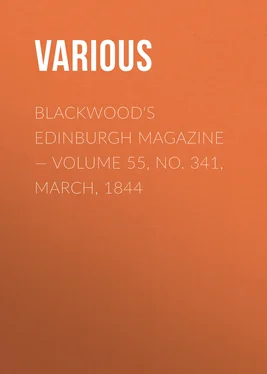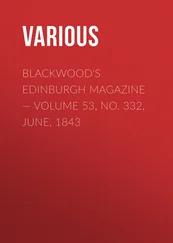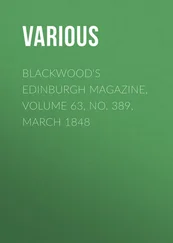Various - Blackwoods Edinburgh Magazine – Volume 55, No. 341, March, 1844
Здесь есть возможность читать онлайн «Various - Blackwoods Edinburgh Magazine – Volume 55, No. 341, March, 1844» — ознакомительный отрывок электронной книги совершенно бесплатно, а после прочтения отрывка купить полную версию. В некоторых случаях можно слушать аудио, скачать через торрент в формате fb2 и присутствует краткое содержание. Жанр: foreign_antique, periodic, foreign_edu, на английском языке. Описание произведения, (предисловие) а так же отзывы посетителей доступны на портале библиотеки ЛибКат.
- Название:Blackwoods Edinburgh Magazine – Volume 55, No. 341, March, 1844
- Автор:
- Жанр:
- Год:неизвестен
- ISBN:нет данных
- Рейтинг книги:5 / 5. Голосов: 1
-
Избранное:Добавить в избранное
- Отзывы:
-
Ваша оценка:
- 100
- 1
- 2
- 3
- 4
- 5
Blackwoods Edinburgh Magazine – Volume 55, No. 341, March, 1844: краткое содержание, описание и аннотация
Предлагаем к чтению аннотацию, описание, краткое содержание или предисловие (зависит от того, что написал сам автор книги «Blackwoods Edinburgh Magazine – Volume 55, No. 341, March, 1844»). Если вы не нашли необходимую информацию о книге — напишите в комментариях, мы постараемся отыскать её.
Blackwoods Edinburgh Magazine – Volume 55, No. 341, March, 1844 — читать онлайн ознакомительный отрывок
Ниже представлен текст книги, разбитый по страницам. Система сохранения места последней прочитанной страницы, позволяет с удобством читать онлайн бесплатно книгу «Blackwoods Edinburgh Magazine – Volume 55, No. 341, March, 1844», без необходимости каждый раз заново искать на чём Вы остановились. Поставьте закладку, и сможете в любой момент перейти на страницу, на которой закончили чтение.
Интервал:
Закладка:
Aden's reputation for barrenness is an old one—"Aden," says Ben Batuta of Tangiers, "is situate upon the sea-shore; a large city without either seed, water, or tree." This was written five hundred years ago; yet the ruins of fortifications and watch-towers along the rocks, show that even this human oven was the object of cupidity in earlier times; and the British guns, bristling among the precipices, show that the desire is undecayed even in our philosophic age.
Yet the Arab imagination has created its wonders even in this repulsive scene; and the generation of monkeys which tenant the higher portion of the rocks, are declared by Arab tradition to be the remnant of the once powerful tribe of Ad, changed into apes by the displeasure of Heaven, when "the King of the World," Sheddad, renowned in eastern story, presumptuously dared to form a garden which should rival Paradise. The prophet Hud remonstrated; but his remonstrances went for nothing, and the indignant monarch and his courtiers suddenly found their visages simious, their tongues chattering, and their lower portions furnished with tails—a species of transformation, which, so far as regards visage and tongue, is supposed to be not unfrequent among courtiers to this day. But this showy tradition goes further still. The Bostan al Irem (Garden of Paradise) is believed still to exist in the deserts of Aden; though geographers differ on its position. It still retains its domes and bowers—both of indescribable beauty; its crystal fountains, and its walks strewed with pearls for sand. It is true, that no living man can absolutely aver that he has seen this place of wonders; but that is a mere result of our very wicked age. This has not been always the case; for Abdallah Ibn Aboo Kelaba passed a night in its palace in the reign of Moowiych, the prince of the Faithful. Lucky the man who shall next find it, but unlucky the world when he does; for then the day of the general conflagration will be at hand. In the mean time, it remains, like the top of Mount Meru, covered with clouds, or, like the inside of a Chinese puzzle, a work of unrivaled art, conceivable but intangible by man.
In this pleasant mingling of fact, visible to his shrewd eye, and fiction drawn from ancient fancy, Major Harris leads us on. But Aden is not yet exhausted of wonders—an island in its bay, Seerah, (the fortified black isle,) is pronounced to have been the refuge of Cain on the murder of Abel; and its volcanic and barren chaos is no unequal competitor for the honour with the rocks of the Caucasus.
But England, which changes every thing, is changing all this. Within the next generation, the railway will run down the romances of Nutrib; a cotton manufactory will send up its smokes to blot out the celestial blue by day, and shoot forth its sullen illumination by night, over the anointed soil; the minstrel will turn policeman, and the sheik be a justice of peace; political economy will have its itinerant lecturers, enlightening the Bedouins on the principles of rent and taxes; the city will have a lord mayor and corporation of the deepest black; the volcano will be planted with villas; turnpikes will measure out the sands; a hotel will flourish on the summit of Jebel Shemshan; and Aden will differ from Liverpool in nothing but being two thousand miles further from the smoke and multitudes of London.
The Arab is still the prominent person among the native population of this territory. Major Harris describes him well. The bronzed and sunburnt visage, surrounded by long matted locks of raven hair; the slender but wiry and active frame, and the energetic gait and manner, proclaimed the untamable descendant of Ishmael. He nimbly mounts the crupper of his now unladen dromedary, and at a trot moves down the bazar. A checked kerchief round his brows, and a kilt of dark blue calico round his frame, comprise his slender costume. His arms have been deposited outside the Turkish wall; and as he looks back, his meagre, ferocious aspect, flanked by that tangled web of hair, stamps him the roving tenant of the desert. It is curious to find in this remote country a custom similar to that of the fiery cross, which in old times summoned the Celtic tribes to arms. On the alarm of invasion, a branch, torn by the priest from the nebek , (a tree bearing a fruit like the Siberian crab,) is lighted in the fire, the flame is then quenched in the blood of a newly slaughtered ram. It is then sent forth with a messenger to the nearest clan. Thus, great numbers are assembled with remarkable promptitude. In the invasion under Ibrahim Pasha, sixteen thousand of these wild warriors were assembled from one tribe. They crept into the Egyptian camp by night, and, using only their daggers, made such formidable slaughter, that the Pasha was glad to escape by a precipitate retreat.
The Jews form an important part of the population, as artizans and manufacturers. Feeling the natural veneration for the Chosen People in all their misfortunes, and convinced that the time will come when those misfortunes will be obliterated, it is highly gratifying to find, that even in this place of their ancient sufferings, they are beginning to feel the benefit of British protection. Hitherto, through their indefatigable industry, having acquired opulence in Arabia as elsewhere, they were afraid either to display or to enjoy it; but now, under the protection of the British flag, they not merely enjoy their wealth, but they publicly practise the rights of their religion. Stone slabs with Hebrew inscriptions mark the place of their dead. They have schools for the education of their children; and their men and women, arrayed in their holiday apparel, sit fearlessly in the synagogue, and listen to the reading of the law and the prophets, as of old. It is a great source of gratification to the philanthropist to find, that wherever England extends her power, industry, commerce, and peace are the natural result. Aden, barren as the soil is, is evidently approaching to a prosperity which it never possessed even in its most flourishing days. Emigrants from Yemen and from both shores of the Red Sea, are daily crowding within the walls, through the security which they offer against native oppression. In the short space of three years, the population has risen to twenty thousand souls. Substantial dwellings are rising up in every quarter, and at all the adjacent ports hundreds of native merchants are only waiting the erection of permanent fortifications, in token of our intending to remain, to flock under the guns with their families and wealth. The opinion of this intelligent writer is, that Aden, as a free port, whilst she pours wealth into a now impoverished land, must erelong become the queen of the adjacent seas, and rank amongst the most useful dependencies of the British crown.
The mission having remained some time at Aden, to purchase horses and stores, sailed on the 15th May; and, on losing sight of Aden, the members of the mission characteristically took the "Pilgrims' vow" not to shave until their return. On the 17th they opened the town of Tajura, on the verge of a broad expanse of blue water, over which a gossamerlike fleet of fishing catamarans already plied their craft. Their pilot, an old Arab, was a man of fun, and the specimens of his tongue are good. In some reference to the anchorage, he said, "Now if we only had two-fathom Ali here, you would not have all these difficulties. When they want to lay out an anchor, they have nothing to do but to hand it over to Ali, and he walks away with it into six or eight feet without any ado. I went once upon a time in the dark to grope for a berth on board of his buggalow, and, stumbling over some one's toes, enquired to whom they belonged. 'To Ali,' was the reply. 'And whose knees are these?' said I, after walking half across the deck. 'Ali's.' 'And this head in the scuppers, pray whose is it?' 'Ali's; what do you want with it?' 'Ali again!' I exclaimed; 'then I must even look for stowage elsewhere.'"
Читать дальшеИнтервал:
Закладка:
Похожие книги на «Blackwoods Edinburgh Magazine – Volume 55, No. 341, March, 1844»
Представляем Вашему вниманию похожие книги на «Blackwoods Edinburgh Magazine – Volume 55, No. 341, March, 1844» списком для выбора. Мы отобрали схожую по названию и смыслу литературу в надежде предоставить читателям больше вариантов отыскать новые, интересные, ещё непрочитанные произведения.
Обсуждение, отзывы о книге «Blackwoods Edinburgh Magazine – Volume 55, No. 341, March, 1844» и просто собственные мнения читателей. Оставьте ваши комментарии, напишите, что Вы думаете о произведении, его смысле или главных героях. Укажите что конкретно понравилось, а что нет, и почему Вы так считаете.












